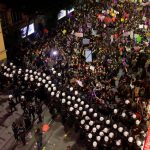The carnage in New Zealand has come as the strongest reminder of the validity of Samuel Huntington’s thesis on the “Clash of Civilisations,” which once was ignored, attacked or marginalised as a project by conspiracy theorists. It is, however, as valid as ever and should be taken seriously. His essay was full of foresight.
Huntington said Turkey has become, since the first world war, a “classic torn country,” a nation with a single predominant Islamic culture that places it in a sphere of civilisation while its leaders, led by Ataturk, sought until the 1990s to shift it to another civilisation.
Thus, argued Huntington, as the clash of civilisations thrusted in slow motion a tectonic shift on a global scale post-Cold War, Turkey would be on the most sensitive of the cultural and political fault lines.
For some time, all that has taken place in Ankara supports Huntington’s predictions. It is as if Turkish President Recep Tayyip Erdogan has read the book, agreed with its thesis and done everything in his might to prove Huntington right. Erdogan does it in a grand scale to position Turkey as the battlefront against the West.
There is, of course, no indication that Erdogan is aware of the content of the book and one can easily argue that the main motive behind Erdogan’s acrimonious rhetoric — having crossed the line towards hate speech — is aimed at personal interests for political survival but the effect of his choice of words weakens the cultural ground that Turkey’s complex society stands on.
As the massacre at two mosques in New Zealand led to a global mood of mourning and wave of condolences from all faiths, Erdogan and his men did not hesitate to take an opposite stand, using the carnage to whip up hatred against the “crusading West.” He would argue that “if you don’t deal with attacks against Islam, we will.”
Some may argue that, for Erdogan, the massacre was “God’s gift” to distract attention from a sharply declining economy at home, for which Erdogan has no magic solutions to offer, and restore voter support around him.
However, there is more to it. Erdogan has been sowing rage and contempt, feeding the arsenal of revenge in Turkish society, whose ignorance makes it utterly vulnerable to such provocations. The diversion of Turkey from the values of democratic parts of civilisation seems irreversible.
Many people in Turkey are mesmerised by such venomous discourse. The more self-conscious Erdogan becomes of the imaginary threats around him, the more relentless he becomes in breaking all barriers. It is no wonder that after the massacre in Christchurch, Erdogan used the commemoration of the mass suffering in Gallipoli in World War I as a leverage to desecrate the collective pain that still sits in the memory of New Zealand and Australia.
“Your grandfathers came here… some returned in coffins. If you come with the same intentions, we await you, too… We understand your hatred and spite is alive… You should have no doubt that we will send you off like your grandfathers,” Erdogan said.
Erdogan covered the memory of Ataturk and Turkey with a blanket of shame, shattering whatever image Turkey had left as a member of the humane part of civilisation. That is the act that was staged to prove Huntington right.
There should be no doubt that, under Erdogan, surrounded by like-minded cronies, Turkey will be pushed beyond the limit in this direction. Erdogan seemingly feels he owes his success, his sense of invincibility, to himself only. That’s the reason he has nobody around to stand up to him. Anybody doing so would risk doing it at her or his peril. Erdogan will not be stopped from following his own personal agenda.
After the massacre, the Washington Post likely surprised its readers by publishing a column with Erdogan’s byline. In a 180-degree reversal from the position he has been showing, Erdogan was keen to appear as a leader of peace and sound reasoning.
There was no doubt the column was a product for spin, obviously written by Erdogan’s panicking advisers. They may congratulate themselves in succeeding to get the text published but it cast serious doubt on the Post’s reputation as a bastion of critical judgment. Western mainstream media should be much more cautious before giving space to autocrats or they will be also seen as those serving to prove Huntington’s predictions of a global crash.



